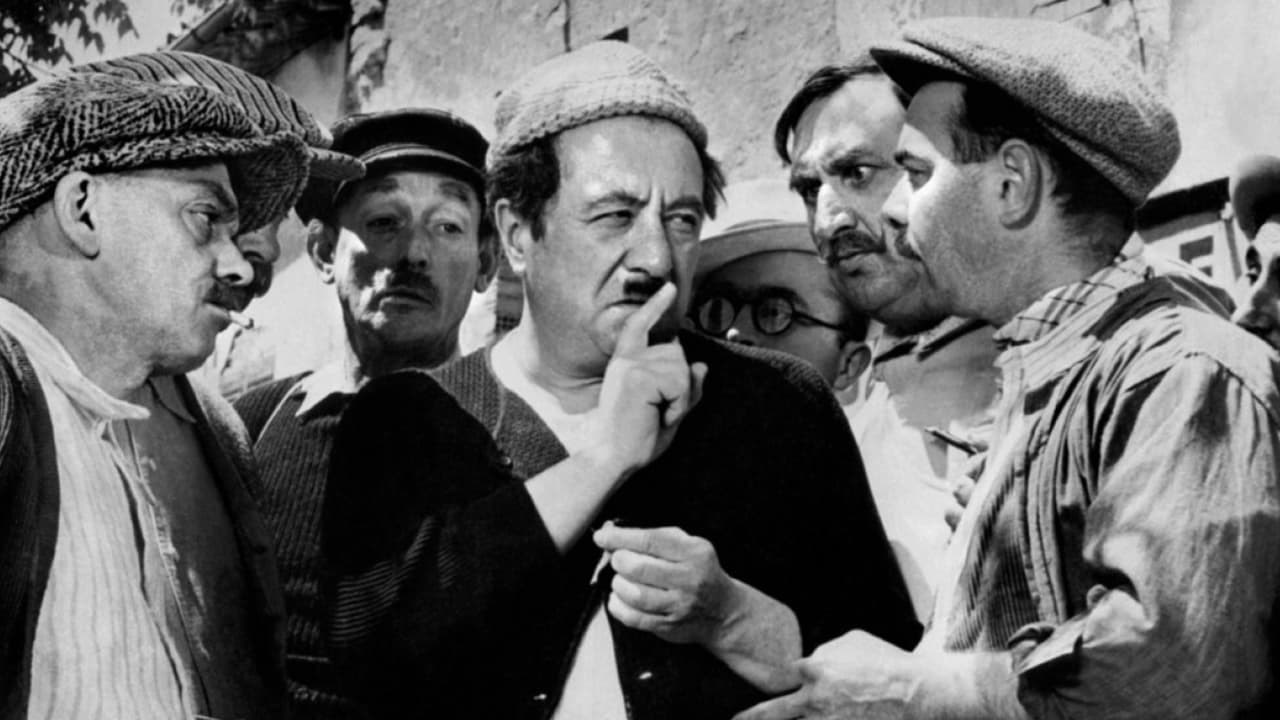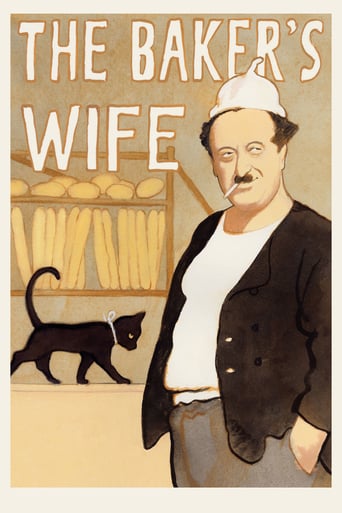GamerTab
That was an excellent one.
Nonureva
Really Surprised!
Tedfoldol
everything you have heard about this movie is true.
Jackson Booth-Millard
I knew nothing about this French film before I found it listed in the book 1001 Movies You Must See Before You Die, it was rated well by critics, and I hoped it would be something worthy of its placement in the book. Basically in an idyllic Provencal village in the south of France, Aurélie (Ginette Leclerc) is the young and beautiful wife of the new baker, Aimable (Raimu). But the baker is devastated when he finds his wife has left him, she has run off during the night with a handsome young shepherd, Dominique (Charles Moulin). The baker tells the villagers that she has left suddenly to see her mother, but they are not fooled, and their efforts to console him are shunned. He goes to the Sunday mass, and is upset by what seems an unfeeling sermon by an inexperienced young Priest (Robert Vattier), after which he goes to a café and gets publicly drunk. The heartbroken baker can no longer bake bread anymore, so Marquis (Fernand Charpin), who is the local landowner, and the Schoolteacher (Robert Bassac) take the situation in hand, with the priest they arrange a public meeting to discuss solutions. The people decide to mount an exhaustive search to find the baker's wife, as they want to regain their daily bread. One of the people does a report a sighting, she is seen in a glade with the shepherd, naked. The priest and the schoolteacher are chosen for the delicate task of persuading her to return, the shepherd flees, and the priest takes her to a quiet place, which the schoolteacher returns with the good news that she has been found. The priest reads her the story of Jesus and the woman taken in adultery, after this he forgives her and takes her home. The first word the baker's wife says to her husband is "Sorry", he forgives her, but he cannot resist talking about young shepherds who charm her, love her and leave her. It is a simple story of a faithless wife tempted by another man, and the local people working together to help the baker, so he will provide them with their produce, the feeling of the communal atmosphere works well, it is very old-fashioned, including its use of black-and-white, but if it was supposed to be funny, I wasn't laughing much, all in all it's a reasonable comedy drama. Worth watching!
Boba_Fett1138
This is a movie with a very warm and pleasant atmosphere. It has a childish innocence over it, like basically all these typical genre movies from the '30's seem to have.It's atmosphere, story and characters make this a very pleasant and entertaining movie to watch. It has a very simple concept, in which a French baker's wife run of with a shepherd, after the first night they moved in to a small village, in the middle of the countryside. After this the baker refuses to make bread anymore. The villagers of course want their daily fresh bread so they together come up with a plan to get her back to the bakery. It all sounds very simple but thanks to its fine storytelling from director Marcel Pagnol it all works out real well. There also is of course more to the story, courtesy of some fine input from the movie its characters and actors portraying them.It's a well cast movie, with French character actor Raimu in the main lead. The other cast members all have some very characteristic look over them, the way only the French can look. I'm not too happy about the casting of Ginette Leclerc though. She is supposed to be a very pretty woman in the movie but just look at the way Leclerc look...she is no natural beauty. Or perhaps her looks just were the idea of a true beauty, in the France of the 1930's.It takes a while for the movie to pick up its pace and the movie also tends to drag on a bit in its middle part but in the many parts that the movie finds its right pace, the movie is a great one. It's a real enjoyable comedy, that is not the type of comedy that has some hilarious moments that will make you laugh out loud in it but it's more the type of comedy that tries to constantly entertain. It doesn't fail at that, thanks to the movie its very pleasant atmosphere, simplistic story and likable characters. Especially the movie its last halve, in which the villagers start to undertake action, is just great.A fun and warm little movie.8/10http://bobafett1138.blogspot.com/
richard-1787
Along with Marius, La Femme du boulanger is at the top of the list of Pagnol's films, which is to say that it is among the best films ever made. (This is not just my opinion; evidently Orson Welles said the same thing.) It is a "typical" Pagnol film, in that the plot is rudimentary at best. All the interest is the characters and their dialogue. And, despite very good performances by several of the supporting characters, this film achieves greatness because of the dialogue Pagnol gave Aimable (the baker) and the way Raimu delivers it. A mixture of the most moving pathos and the funniest comedy, the Baker is one of the great characters in film. (Trust me, the chapter in Giono's novel that served as the ostensible "inspiration" for this story is negligible. The genius is all Pagnol's.) The scene that every Frenchman knows is the last one, when Aimable takes out his anger at his wife's infidelity on their cat, Pomponette, but that is an atypical moment in this movie. It is all about Aimable's suffering, at the hands of his wife but also as a result of the way the town treats him. And Raimu conveys that suffering as only the greatest actors have: with understatement.Marius is funnier and has greater variety of character. But La Femme du boulanger shows what a great director and screenwriter can do with great actors. Movies get no better than this.
writers_reign
This one comes with a rep that almost dares you NOT to like it for none other than the Great Orson Welles declared it the greatest movie ever made and star Raimu the greatest actor. Welles is no slouch himself and many there are, including myself, who consider his own Citizen Kane to be in the all-time No #1 spot but, let's face it, old Awesome knows a thing or two when it comes to judging celluloid. This is, of course, a Marcel Pagnol production which presupposes several things; it will be set in the South of France barely a Long Shot from Marseille and it's twelve to seven to feature Raimu heading an ensemble cast of Pagnol regulars. So it is here with Raimu as the eponymous baker who has barely sold his first batch than his wife takes it on the Jesse Owens with the local stud. The smiles, if not outright belly laughs, on the faces of the villagers freeze pretty damn quick once they realize that no wife equals no bread which means that they set about locating and returning the wife. End of (very simple) story. But as someone once said it's the way you tell them and Pagnol has Scherezade beat seven ways from the middle; once again as in his celebrated trilogy (Marius, Fanny, Cesar, in case you just got here via a wormhole) he evokes an entire community with just a few strokes of the pen or, in this case, lens, so that what we have is a lovingly painted portrait of a small town not a million miles from the one Jack Ford devised for The Quiet Man and complete with a richly assorted set of residents. The closing scene where the errant wife ignites the fire in the oven may be a tad symbolic but when it occurs in such a warm film who cares.

